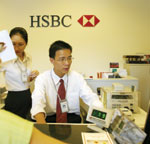Foreign banks prepare to branch out
The banking industry is bracing itself for the opening of foreign banks’ 100 per cent foreign-invested subsidiaries by April next year, following the signing of the Vietnam-US bilateral WTO market access agreement, which will open the doors of banking services to foreign investors.
 Local branches will need to measure up to foreign banks |
According to the US Trade Representative Office, as of April 1, 2007, the US and other foreign banks will be able to establish 100 per cent foreign-invested subsidiaries. As Vietnamese legal entities, these subsidiaries will receive non-discriminatory “national” treatment upon Vietnam’s accession to the WTO.
US banks will be able to establish a 100-per cent foreign-invested bank subsidiary, take unlimited local currency deposits from legal entities, and issue credit cards.
Vietnam currently limits foreign banks to a minority shareholding position of 49 per cent in a joint venture, but allows the establishment of bank branches and representative offices.
According to Governmental Decree No. 22 on the organisation and operation of foreign bank branches, joint venture banks and 100 per cent foreign owned banks and representative offices — wholly foreign-invested banks will be able to receive operating licences from March 24. The decree also states that foreign firms must have at least $10 billion in assets to set up a wholly foreign-invested bank in Vietnam.
Lawrence Wolfe from Deutsche Bank said some foreign banks are quite interested in establishing 100 per cent foreign owned banks in Vietnam while the decree’s circular for guiding the implementation has not yet been issued.
He said the circular should clarify issues which have been raised by foreign banks such as whether a foreign bank can operate in more than one form in Vietnam; the transaction language; special control regime; information sharing; transaction points; State Bank of Vietnam approval for the appointment of Country Manager and branch manager of a foreign bank branch; and the freezing of assets.
Kieu Huu Dung, director of the bank and non-bank credit institution department under the State Bank of Vietnam, said the agreement is a victory to gradually opening the banking sector to foreigners as the government prepares for the new integration context.
The WTO agreement is more as regards setting up 100 per cent foreign-invested banks compared with the US-Vietnam bilateral trade agreement (BTA). Under the BTA, US banks will be permitted to set up wholly foreign-invested banks by 2010 with no limitation on local currency deposits, three years behind the WTO agreement.
The circular is being compiled and scheduled for approval in the third quarter of this year or later. However, under the latest draft circular, the chartered capital required for a 100 per cent foreign owned bank would be set tentatively at VND1 trillion ($62.8 million), which can also be applied to new domestic banks, or nation-wide treatment for every bank.
“The number of banks in Vietnam is still high and will be slashed down to properly 15 banks in the next few years once the market is mature . By then, stricter conditions on chartered capital required for opening new subsidiaries for both domestic and foreign banks will be much higher,” said Dung.
The country has 31 foreign bank branches from 13 countries and territories, 44 representative offices of foreign banks in Vietnam along with five joint venture banks. There are 25 urban joint stock commercial banks and 12 rural organisations along with six state-owned commercial banks.
Vietnam will also open up its securities market to foreign investors. At the date of Vietnam’s accession to the WTO, foreign securities firms will be able to open joint-ventures with up to 49 per cent foreign ownership. After five years, foreigners will be able to own 100 per cent of securities firms and will be able to branch into Vietnam for some securities activities (asset management, advisory, and settlement and clearing services) instead of opening a representative office.
Foreign-invested firms established in Vietnam will be afforded national treatment, across all other financial services sub-sectors. Cross-border market access commitments will be comparable, or superior, to those of OECD countries.
No. 766/June 19-25, 2006
What the stars mean:
★ Poor ★ ★ Promising ★★★ Good ★★★★ Very good ★★★★★ Exceptional
Related Contents
Latest News
More News
- Cashless payments hit 28 times GDP in 2025 (February 04, 2026 | 18:09)
- SSIAM and DBJ launch Japan Vietnam Capital Fund (February 04, 2026 | 15:57)
- Banks target stronger profits, credit growth in 2026 (February 04, 2026 | 15:43)
- Vietnam on path to investment-grade rating (February 03, 2026 | 13:07)
- Consumer finance sector posts sharp profit growth (February 03, 2026 | 13:05)
- Insurance market building the next chapter of protection (February 02, 2026 | 11:16)
- NAB Innovation Centre underscores Vietnam’s appeal for tech investment (January 30, 2026 | 11:16)
- Vietnam strengthens public debt management with World Bank and IMF (January 30, 2026 | 11:00)
- Corporate bond market poised for stronger growth cycle (January 28, 2026 | 17:13)
- Vietnam's IPO market on recovery trajectory (January 28, 2026 | 17:04)

 Tag:
Tag:




















 Mobile Version
Mobile Version